Evaluating Deku's Abilities Against Pro Heroes
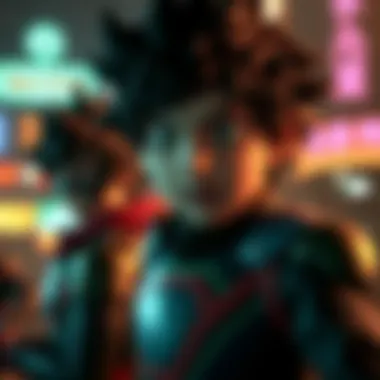
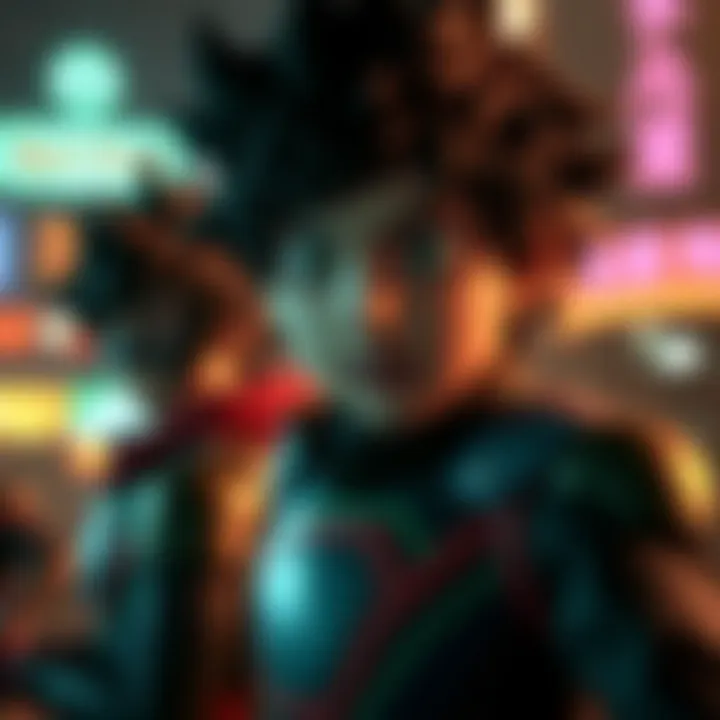
Intro
In the vivid world of My Hero Academia, Izuku Midoriya, affectionately known as Deku, stands as a beacon of growth and perseverance. From a quirkless wannabe hero to a burgeoning powerhouse wielding One For All, Deku’s journey is not merely about gaining strength; it’s also a reflection on what heroism truly entails. As he navigates the complexities of his abilities, which have evolved considerably throughout the series, one can't help but ponder how he stacks up against the seasoned professional heroes who occupy this universe.
Deku’s tale intertwines personal ambition with broader themes of legacy and morality. This exploration will unravel the multifaceted nature of his quirk, the rigorous training that shapes his strategies, and the implications of his potential confrontations with established heroes. Through this lens, we’ll evaluate the essence of heroism amid the shifting dynamics of power and responsibility.
By taking a closer look at these aspects, readers can gain profound insights into Deku’s character and development, providing clarity on the significance of his place within a community that values strength and virtue. As we embark on this analysis, let’s consider not only Deku's raw abilities but also the intricate layers of his character, intellectual growth, and the socio-ethical dilemmas surrounding heroism.
In the subsequent sections, we'll delve into Deku's quirk evolution, compare his strategies to those of pro heroes, and assess how ready he truly is to assume the mantle of greatness in a world where every choice counts.
Prolusion
In the sprawling universe of My Hero Academia, the character of Izuku Midoriya, often referred to as Deku, has captured the hearts and minds of fans worldwide. The crux of this article lies in examining how Deku's powers and growth position him against the towering figures of pro heroes. Understanding this dynamic is crucial for grasping the broader themes of heroism that the series explores.
Deku embarks on his journey with a quirk that was untapped and without the illustrious lineage that many pro heroes benefited from. This puts him in a unique spot within the narrative. The importance of dissecting his potential lies not just in his abilities but also in his journey of self-discovery, which mirrors the fundamental values of courage and determination in the face of adversity. Moreover, as Deku learns to harness his abilities through training and mentorship, he reflects the idea that true heroism is often a process rather than an inherent trait.
Ultimately, by delving into Deku's evolution, assessing the intricacies of his quirk, and analyzing how he holds up against seasoned heroes, we reveal fundamental questions about strength, legacy, and what it truly means to be a hero in a world fraught with challenges and moral dilemmas.
Contextualizing Deku within MHA
Deku's story begins in a world where superpowers, or quirks, are the norm. However, unlike most others, he is born without one. This sets the stage for a narrative that is as much about personal growth as it is about the superhero tropes one might find in typical comic stories. His background provides a vital lens through which we can view the social constructs of hero society in My Hero Academia.
In a setting where heroes are revered and seen as the pinnacle of personal achievement, Deku represents the underdog—an archetype that resonates profoundly within the genre. His journey showcases the struggle between societal expectations and personal aspirations. Having started from a place of weakness allows viewers to engage deeply with his trials and triumphs, providing a sense of relatability that isn't common among the naturally gifted characters populating the series.
By observing the interplay of Deku's character within the greater narrative, we start to appreciate not just his personal growth but also how that mirrors societal themes about ability, merit, and heroism itself. Through his lens, My Hero Academia invites us to ponder: What does it mean to be a hero? Is strength always equated with power? And can the ones without a labeled gift still aspire to greatness?
As we move through the sections of this article, these questions will guide and inform our exploration of Deku and his standing among the pro heroes.
Understanding Deku's Quirk
Understanding Izuku Midoriya's quirk, One For All, is vital to assessing his potential against the pro heroes of My Hero Academia. Without grasping the intricacies of this unique quirk, one cannot appreciate how Deku stacks up against seasoned warriors in the hero society. At its core, One For All is not merely about raw power; it encapsulates the very essence of growth, legacy, and the burden of responsibility that comes with heroism. The layers of Deku's abilities unfold across numerous pivotal moments in the narrative, revealing the depth of his character and the formidable challenges he faces.
Origins of One For All
The story of One For All begins with a hero named All Might. He represents the pinnacle of what it means to be a hero, and his quirk embodies strength across generations. Initially created as a gift to empower the weak, One For All has morphed into a legacy passed down to those deemed worthy. Each user transfers the quirk, adding their own strength and enhancing its capabilities. This lineage effect is crucial; it allows Deku to tap into the accumulated power of previous users.
The history of One For All is filled with sacrifices and triumphs. For instance, the ability initially started with the brother of the villain, All For One, who sought to use his power for domination. Ironically, the very act of handing down this quirk symbolizes the struggle against tyranny. This contrast between generosity and greed adds a rich layer to Deku’s journey. As he trains and learns, he inherits not only abilities but also lessons and struggles that have shaped his predecessors. The wide-ranging timeline of One For All reinforces the contextual significance of Deku's transformation from a quirkless boy to a formidable contender against everyone in his age bracket, including professional heroes.
Deku's Unique Adaptations
Deku's journey with One For All is not merely about wielding explosive strength; it showcases how he adapts and evolves with the quirk. Initially, his body struggled to handle the power, causing painful injuries. However, instead of shying away, Deku embraced this challenge head-on; he studied and adapted his fighting style around his limitations. This strategy is where he truly shines, differentiating himself from the pro heroes who often rely solely on their inherent abilities.
For instance, Deku's analytical thinking allows him to make use of One For All in creative ways. One of the most notable adaptations involves his use of shoot style, where he incorporates powerful kicks rather than exclusively relying on punches. This change not only eases the tension on his arms but also grants him agility that complements his combat style.
Deku’s unique adaptations to One For All reveal a crucial difference in mindset — where others might depend heavily on their quirk as their primary strength, he combines tactical awareness with physical ability. This fusion creates a distinct combat approach, allowing Deku to turn vulnerabilities into strengths.
Deku’s continual refinement of One For All aligns with the notion that true growth transcends mere power; it incorporates the wisdom of experience, mistakes, and evolving tactics, invigorating his character against the backdrop of pro heroes who may have become complacent in their abilities.
In a world where powers dictate the course of battles, Deku redefines the battlefield through strategic adaptation, proving that knowledge sometimes trumps raw strength.
Overall, understanding Deku's quirk is essential for grasping the complexities of his composition as a hero. It adds depth to his character while questioning the very foundation of what it means to be strong.
Pro Heroes Overview
In the world of My Hero Academia, pro heroes play a pivotal role in maintaining peace and order, serving as exemplars of heroism and models for aspiring individuals like Izuku Midoriya, or Deku, himself. Understanding these characters is essential for assessing Deku’s potential against them. Through this analysis, we can uncover what makes pro heroes not only effective in their careers but also how their varied attributes influence their interactions with young heroes.
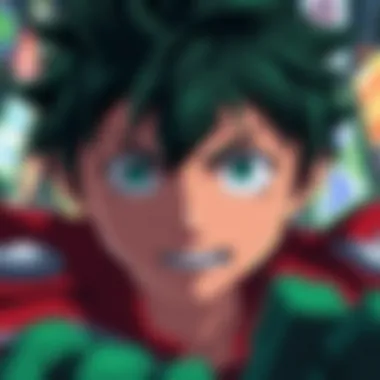
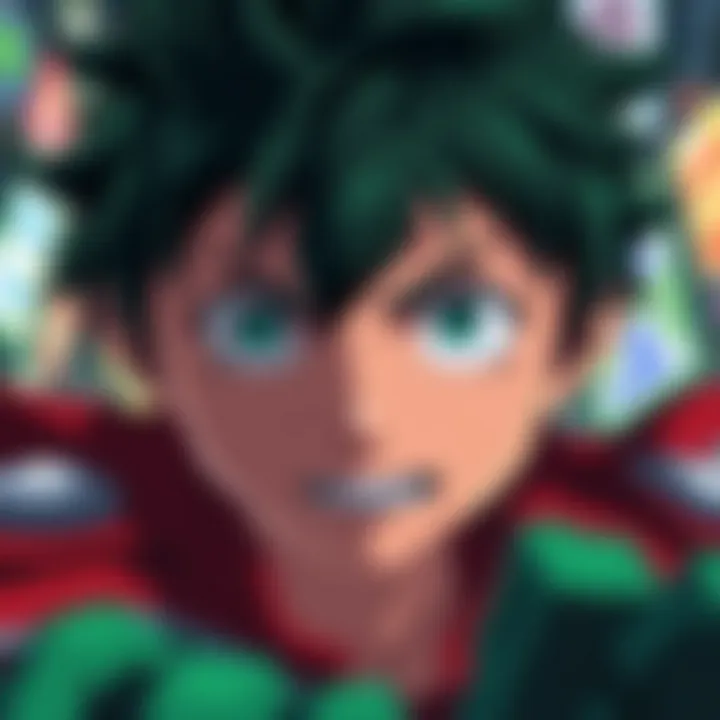
Key Attributes of Pro Heroes
Pro heroes are not just celebrated figures in the community; they embody a set of key attributes that set them apart. These attributes include:
- Strength and Stamina: Physical prowess is a cornerstone of hero work. Each hero must be prepared to face off against formidable foes while ensuring they can endure prolonged battles.
- Intelligence and Strategy: Raw power may win fights, but brains win wars. Pro heroes excel not just in combat, but in strategizing their approach, allowing them to outmaneuver complex scenarios.
- Dedication to Training: Their rigorous dedication sets a significant example for aspiring heroes like Deku. Continuous training ensures they're always ready for whatever comes their way.
- Morality and Ethics: What makes a hero is often their moral compass. Each pro hero operates within a framework of ethics that guides their actions, making them figures of inspiration.
It’s these attributes that give pros their edge and make a formidable challenge for emerging heroes. For Deku, watching and learning from these seasoned veterans is crucial in shaping his own abilities.
Diversity of Quirks and Skills
The diversity of quirks among pro heroes contributes not only to their effectiveness but also to the fascinating dynamics of the My Hero Academia universe. This variety can be categorized as follows:
- Elemental Quirks: Heroes like Shoto Todoroki utilize fire and ice, allowing them to adapt to different combat situations. This adaptability makes them unpredictable in battles.
- Support Quirks: Some heroes focus on providing assistance rather than direct confrontation. Eraser Head, for instance, can nullify others' quirks, a unique edge in strategic confrontations.
- Physical Enhancements: Characters such as All Might possess overwhelming physical strength, which can overwhelm opponents quickly, showcasing brute force as a tactic.
- Unique Applications: With diverse quirks comes unique applications. Pro heroes like Fat Gum use their physicality combined with their quirk creatively, surprising foes with their tactical prowess.
The combination of these varied quirks enhances the overall narrative and tension within the series, presenting a rich tapestry against which Deku must refine his own abilities.
"A true hero isn’t measured by his power, but by how he uses it in the face of adversity."
As Deku continues to grow, understanding these diversities may provide him the insight needed to leverage his own quirk to its fullest potential in battles against pro heroes.
Training and Development
In the ever-evolving landscape of My Hero Academia, the significance of training and development for Deku cannot be overstated. As he aspires to become a pro hero, his continuous growth reflects the gradual mastery of his powerful quirk, One For All. This section addresses the vital components contributing to his enhancement and readiness for confrontations with professional heroes. The rigorous training regimens and the influence of mentorship are crucial in shaping Deku's abilities, pushing him beyond his limits and reshaping his character.
Deku's Training Regimens
Deku's journey involves intense and multifaceted training methods tailored to his unique needs. Unlike some of his peers who may have natural talent or stable quirks, Deku must navigate the complexities of One For All, adopting a diverse array of strategies to harness its power. His training isn't simply about physical prowess; it fundamentally intertwines mental conditioning and tactical understanding.
- Physical Conditioning: From early on, Deku's training emphasized building his strength and stamina. He often participates in rigorous exercises designed to test his endurance and agility, adapting to one of the most potent quirks in existence.
- Technique and Control: One remarkable aspect of Deku's training includes his focus on controlling the immense power that One For All provides. He engages in countless simulations, testing out new techniques like the shoot-style approach that showcases his evolution as a fighter. Through consistent practice, he learns not only to increase his offensive capabilities but also to protect his body from potential injuries.
- Real-World Scenarios: Learning in dynamic environments, like during the U.A. Sports Festival or encounters with villains, has provided Deku with practical experience. It’s one thing to devise a strategy in theory, but it is an entirely different ballgame when you’re amidst the chaos of a battle.
The Impact of Mentors
The support and guidance from seasoned heroes play a critical role in shaping Deku's growth. Each mentor he encounters bestows upon him valuable lessons that would take years of discovery otherwise, helping him refine his skills and enhancing his decision-making.
- All Might: As his primary mentor, All Might has laid down the foundation of Deku’s hero ideology. Their interactions not only impart combat techniques but also emphasize the importance of heart and determination. All Might teaches Deku that heroism goes beyond mere strength; it is about inspiring others and standing up for what’s right.
- Gran Torino: Training under Gran Torino introduces Deku to advanced combat tactics and the importance of strategy in battles. Gran Torino's focus on agility and quick thinking challenges Deku to rethink his approach to fighting. He learns about timing and precision, skills which ultimately differentiate him from others.
- Class 1-A Peers: The camaraderie and competition among classmates foster a supportive atmosphere that encourages mutual growth. Deku learns vital teamwork skills and diverse combat styles from his peers, which help in understanding how to adapt to different situations.
In summary, the training and development of Deku play a foundational role in his narrative arc. Each regimen, whether physically demanding or strategically oriented, builds a robust framework, enabling him to stand toe-to-toe against pro heroes. While mentorship emphasizes refinement and wisdom, it complements his relentless drive, ensuring that he doesn't just rely on power but rather becomes a well-rounded hero.
Strategic Thinking in Battle
In the intricate world of My Hero Academia, the clash between heroes and villains often goes beyond sheer strength; the art of battle hinges significantly on strategic thinking. For Izuku Midoriya, known as Deku, his analytical prowess becomes a pivotal element in assessing his potential against seasoned Pro Heroes. Strategic thinking encompasses the ability to anticipate opponents' moves, devise tactical advantages, and adapt swiftly to the nuances of combat scenarios.
Such strategic acumen allows Deku to leverage his unique abilities effectively, especially as he navigates the complexities of One For All. In battles where experience often tips the scales, the ability to think critically can help even the underdog stand shoulder to shoulder with the best.
Deku's Analytical Approach
Deku’s journey is marked by his keen intelligence and methodical mindset, which form the backbone of his strategic thinking. Even before he inherits One For All, he demonstrates an inclination toward analysis during training and encounters. Often, he channels his observations into tactical plans that not only consider his strengths but also factor in the unpredictability of his adversaries.
For instance, during the U.A. Sports Festival, Deku carefully assesses the abilities of his competitors, notably Shoto Todoroki. By watching and adapting to Todoroki’s ice and fire techniques, Deku manages to formulate a strategy that places him at an advantage, utilizing his own agility and speed while keeping Todoroki’s powers in check. This battle underscored his ability to dissect combat dynamics, making rational decisions based on real-time data.
Furthermore, Deku employs his notebook diligently to document various quirks and strategies of both heroes and villains, enhancing his battle awareness. This approach allows him to create action plans tailored to exploit weaknesses, reinforcing the importance of preparation in strategic planning.
Comparison with Pro Hero Strategies
When observing the strategies employed by Pro Heroes, a notable difference emerges in experience and instinct. Professionals like All Might and Endeavor often rely on their honed instincts built from years of facing various threats. Their combat experiences give them an edge, as they are quick to read their opponents and react with strategies that may have evolved through trial and error.
On the other hand, Deku's approach to strategy tends to be more cerebral.
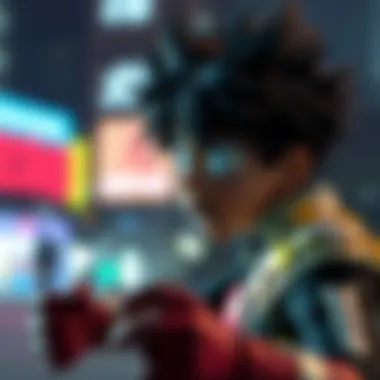
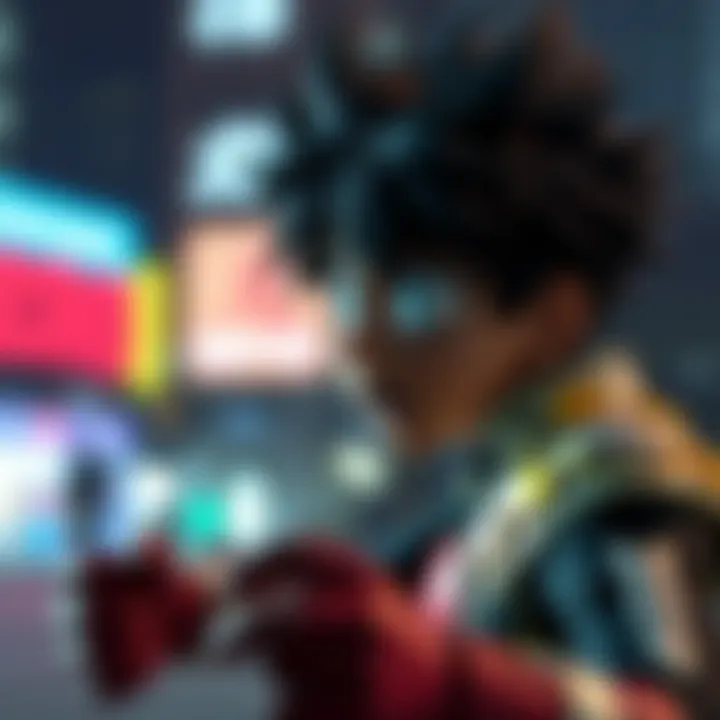
- Advantages of Deku's Approach:
- Challenges Compared to Pro Heroes:
- Strong focus on understanding the adversary, allowing him to preempt actions.
- Adapting strategies from analyzing past encounters and lessons learned.
- Willingness to rethink strategies mid-battle based on new information.
- Less instinctive reaction time may lead to hesitance in critical moments.
- Reliance on analysis, although effective, can sometimes delay decision-making.
Pro Heroes, with their rich history of combat, often manage to blend intuition and strategy — a balance Deku is yet to fully master. However, as he grows and accumulates experiences of his own, it becomes apparent that he is learning to harness these elements effectively.
"Each battle is a lesson, and every opponent teaches you the way to become a better hero."
Potential Scenarios of Confrontation
In the context of examining Deku's abilities within the My Hero Academia universe, considering potential scenarios of confrontation with Pro Heroes is crucial. This analysis serves not only as a speculative exercise but also highlights the complexity of Deku's growth and the variety of factors influencing hero encounters. By envisioning these matchups, readers can better understand how Deku's skills have evolved over time, the strengths he possesses, and the challenges he may face along the way.
Imagining how Deku would fare against seasoned heroes brings to light the varying dynamics of heroism. It isn’t simply a measure of strength; it also involves tactical prowess, adaptability, and emotional intelligence. As we dive deeper into hypothetical confrontations, it's important to consider what these matchups reveal about Deku's character and the broader themes within the series.
Hypothetical Matchups
Imagining scenarios where Deku faces off against the Pro Heroes allows us to ponder various outcomes based on their quirks and experience. For instance, consider a matchup between Deku and All Might, his ultimate mentor. In this imagined encounter, Deku could leverage his analytic skills, focusing on All Might's past weaknesses rather than brute strength.
- Deku vs. Fat Gum: In this scenario, Deku can apply his agility and speed against Fat Gum's sheer bulk. By utilizing his knowledge of how Fat Gum's quirk works, he could devise strategies to outmaneuver him, targeting areas that may not be effectively defended.
- Deku vs. Endeavor: This confrontation poses a real challenge, given Endeavor's immense power and combat experience. Deku must remain strategic, finding openings in Endeavor's attacks while avoiding direct confrontation, showcasing the necessity of tactical planning in hero work.
These hypothetical matchups do not only serve to measure Deku's powers but also to emphasize his evolving thought processes, as he learns from each confrontation, regardless of victory or defeat.
Strengths and Weaknesses Analysis
As we analyze Deku's potential in confrontations with Pro Heroes, evaluating his strengths and weaknesses becomes essential. This dual-lens perspective sheds light on what sets him apart and where he needs further development.
Strengths:
- Resilience: Deku's ability to withstand physical and emotional challenges has been a substantial factor in his journey. He often learns from setbacks, pushing through adversity to emerge stronger.
- Intelligence: His analytical mind allows him to assess situations and strategize effectively. Deku has shown an ability to think on his feet, especially when faced with unpredictable opponents.
- Quirk Mastery: The evolution of One For All has granted him an expanding array of techniques, positioning him as a formidable contender in any confrontation.
Weaknesses:
- Physical Limitations: Despite his growth, Deku often faces the hurdle of overexertion. His body can only handle so much stress, causing potential injuries that can impede his performance in a fight.
- Emotional Turmoil: Often, Deku's strong sense of justice can lead him to make emotional decisions. This can cloud his judgement in high-stress situations, detracting from his tactical abilities.
- Experience Gap: Compared to seasoned Pro Heroes, Deku lacks the extensive combat experience that many heroes have acquired over the years. This gap can be a considerable disadvantage in a direct confrontation.
Overall, understanding these strengths and weaknesses helps paint a clearer picture of Deku's capabilities against professional heroes. It allows readers to appreciate his journey and growth while fostering meaningful discussions about heroism in My Hero Academia.
"In the world of heroes, it's not just strength that counts, but the heart and mind of the individual who wields such power."
The very nature of heroism is complex, and by assessing these scenarios, we walk away with renewed insight into what it means to be a hero, especially through the eyes of someone like Deku.
The Evolution of Deku's Character
The journey of Izuku Midoriya, or Deku, showcases a character arc that resonates deeply within the My Hero Academia universe. Understanding this evolution is crucial as it sets the stage for a broader discussion about his potential. At the core, Deku's transformation reflects the challenges and triumphs that define heroism itself. Analyzing his growth not only sheds light on his personal journey but also uncovers the philosophical themes regarding power and responsibility in the series.
As Deku faces numerous adversities, each conflict presents opportunities for reflection and growth. With every encounter, he learns valuable lessons that help him refine his techniques and perspectives. His evolution is not simply about growing stronger; it’s about developing a more nuanced understanding of what it means to be a hero.
Lessons Learned from Conflicts
Throughout the series, Deku is thrust into a myriad of conflicts that forge his character. From training sessions at U.A. High School to epic battles against notorious villains, each experience imparts wisdom that shapes his approach.
- Resilience in Adversity: One of the most potent lessons that Deku learns is the need to be resilient. During fights against formidable foes, he often faces moments of doubt. However, he consistently pushes through, proving that tenacity is just as crucial as raw power.
- Strategic Planning: Deku’s battles reveal the importance of strategy over brute strength. He often analyzes his opponents and adjusts his tactics accordingly. This adaptability not only showcases his growth but also emphasizes an essential quality of successful heroes—they think before they act.
- Balancing Emotion and Logic: In moments of crisis, Deku grapples with emotion versus logic. His journey teaches him that while passion fuels a hero, maintaining clarity in high-stakes situations is vital. This balance between heart and mind is a recurring theme that resonates well in the narrative.
"A true hero stands firm not only in power but in conviction."
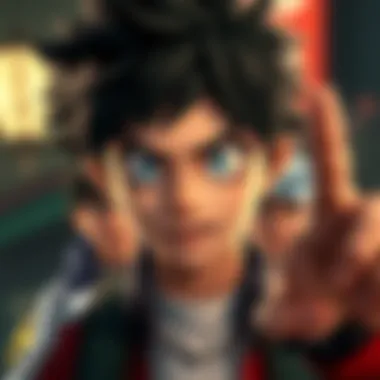
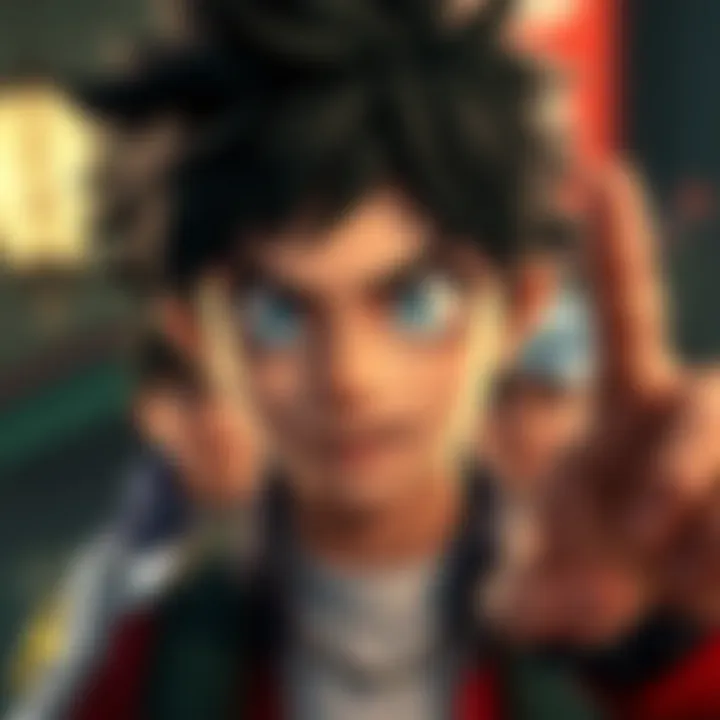
Impact of Relationships
Deku’s evolution is intrinsically linked to the relationships he forms along the way. His connections with mentors, classmates, and even rivals serve to deepen his understanding of heroism and accountability.
- Mentorship by All Might: The bond Deku shares with All Might profoundly influences his trajectory. All Might’s guidance instills foundational principles of heroism in Deku. Through their interactions, Deku learns not only the mechanics of hero work but the ethical underpinnings as well.
- Collaboration with Class 1-A: Working alongside his classmates fosters a spirit of teamwork within Deku. Each character brings unique traits and quirks that complement his. This camaraderie enhances both his strength and emotional intelligence as a future hero.
- Rivalry with Bakugo: The tension with Bakugo offers contrast and drives Deku to become better. Their rivalry—steeped in history—challenges Deku to push past his limits while nurturing respect for growth and competition. This complex dynamic illustrates that relationships, both supportive and contentious, are essential in shaping a hero’s character.
Critical Reception of Deku's Growth
The progression of Izuku Midoriya, known as Deku, has sparked much discourse among fans and critics alike. This aspect of his character development is crucial in evaluating not just his potential in battles against professional heroes, but also the overall messages woven throughout My Hero Academia. Understanding the critical reception of Deku's growth sheds light on how viewers perceive his journey and the themes of heroism, perseverance, and self-discovery depicted in the series.
Deku's evolution is fascinating. From an awkward boy with no quirks to a formidable contender against seasoned professionals, his journey embodies the struggles many face in their pursuit of greatness. This narrative has captivated audiences, allowing fans to reflect on their experiences. The importance of Deku’s maturation goes beyond mere battles; it’s about the transformation of his identity as a hero.
Fan Perspectives on His Development
Fans' views on Deku’s growth are richly varied and often highlight personal connections to his challenges. Many supporters resonate deeply with Deku's initial insecurities and the feeling of being an underdog. His determination to rise above obstacles strikes a chord with people who view themselves as striving to overcome similar hurdles in their own lives.
- Relatable Struggles: Many fans appreciate how Deku's initial struggles mirror their own. His self-doubt and eventual confidence resonate powerfully, leading to a broad fanbase that feels a personal stake in his success.
- Character Complexity: As viewers witness his evolution, they often praise how the series portrays his emotions and internal conflicts. They emphasize how these developments add layers to his character, making him more than just a typical shonen protagonist.
- Inspirational Arc: Ultimately, his growth represents not just physical strength, but the strength of character, which many fans find inspirational.
Deku's development invites a diverse array of opinions while fostering a productive discussion about heroism’s complexities. This multifaceted reception indicates a captivating character deeply intertwined with the show's broader themes.
Comparative Analysis with Peers
When assessing Deku in relation to his peers, the analysis reveals several intriguing contrasts in growth trajectories. Characters like Bakugo and Todoroki also experience significant development, but their journeys differ remarkably from Deku's in both scope and thematic content.
- Unique Quirk Development: While Deku has One For All, Bakugo’s explosive powers and Todoroki's dual ice and fire abilities underscore diverse skill sets. Understanding how these quirks evolve highlights the distinct paths each character navigates, making Deku's development seem even more profound.
- Mentorship Dynamics: Deku benefits greatly from the guidance of All Might. In contrast, characters like Bakugo often rely on raw talent alone before learning humility (albeit begrudgingly). This mentorship element enriches Deku's journey, as it highlights the importance of support from experienced heroes.
- Philosophical Contrasts: Themes such as responsibility and legacy play heavily in Deku's development. In comparison, Bakugo’s growth is intertwined with confrontations with his own shortcomings, serving as a foil to Deku's more collaborative approach.
As these comparisons unfold, it becomes clear that Deku's evolution is not just about personal growth, but also represents a broader commentary on heroism, individuality, and the diverse ways characters confront their destinies.
"Deku’s journey highlights that every hero’s path is unique, shaped by their struggles and relationships."
Philosophical Themes at Play
In the exploration of My Hero Academia, philosophical underpinnings are rife, woven closely into the narrative fabric of the series. These themes are particularly prominent when examining Izuku Midoriya, or Deku, as he navigates his path against seasoned pro heroes. The juxtaposition of ambition and the ethics of power becomes critical when assessing Deku's journey.
As a character who starts with no quirk, Deku's evolution is a representation of the age-old question of what it means to be a hero. His character arc invites audiences to ponder on ideas such as resilience, the essence of strength, and the responsibilities that come coupled with power. This article offers an in-depth look at two primary themes that resound throughout the series, reflecting on their importance not only to Deku’s growth but also to the larger narrative of heroism itself.
The Nature of Heroism
Heroism in My Hero Academia transcends mere physical capability. For Deku, heroism embodies a commitment to helping others, even at personal risk. His transition from a quirkless boy to a capable hero symbolizes an intrinsic belief that heroism is about heart, rather than just the powers one possesses. This speaks volumes about the pressures society places on individuals to conform to certain ideals of strength.
One could argue that the measure of a hero is not in their brute strength or high-ranking prowess, but rather in their willingness to act when others falter. Reflecting on Izuku’s journey, one notices he often aligns his goals with saving others rather than simply competing against the likes of All Might or Endeavor. This stands as a beacon for understanding that true heroism stems from the desire to uplift others, an ideal that allows Deku to stand shoulder-to-shoulder with those already established as pro heroes.
Power and Responsibility
The age-old mantra of power generating responsibility rings loud in Deku's narrative. With the immense capabilities brought by One For All, each new layer of strength requires a deeper sense of accountability. Even in the fight against villains or in competitions among peers, Deku faces numerous instances where he must weigh the consequences of his actions. He understands that his strength can either be a force for good or a potential catalyst for harm.
"With great power comes great responsibility."
This statement embodies the very crux of Izuku's character. He grapples with the moral implications tied to possessing such power, leading to pivotal character moments that challenge him to grow not only as a hero but as a person. It nudges him towards making decisions that prioritizes the safety of others, often leading him into complex confrontations where he must evaluate his motives and the ramifications thereof.
Finale
In the grand tapestry of My Hero Academia, concluding with an assessment of Deku's potential versus pro heroes carries significant weight. This concluding section synthesizes not only Deku's journey but also the broader implications of his evolution within the narrative landscape. Understanding his place among the seasoned professionals adds depth to the ongoing discourse about heroism, power, and responsibility.
Importance of Deku’s Standing
Deku is not just a mere challenger to the pro heroes; he embodies the struggle and aspiration of every aspiring hero within the series. His growth prompts an exploration of key elements that define heroism:
- Transformation: Deku symbolizes the arduous journey every hero undertakes in actualizing their potential. He started from a quirkless boy to wielding immense power, highlighting the essence of perseverance.
- Lessons in Humility: Interactions with pro heroes like All Might and others have greatly influenced Deku's understanding of strength. They emphasize that true heroism involves humility, responsibility, and self-awareness—attributes that are often overshadowed by sheer power.
- Strategic Growth: His analytical mind puts him at a strategic advantage, allowing him to navigate conflicts with a level head. This approach is critical when juxtaposed with the raw strength exhibited by seasoned fighters, emphasizing the theme that brains can sometimes outweighbrawn.
In the end, as Deku continues to develop both personally and in combat capabilities, he raises pertinent questions about the nature of being a hero in a world where power and responsibility must align. His journey resonates deeply with fans, inspiring discussions on what it truly means to stand against established norms and expectations in the pursuit of one's ideals.
“Heroism is not just about the powers one possesses, but the choices one makes.”
As we reflect on Deku's standing, it becomes increasingly clear that he is more than just a competitor; he is a transformative figure whose potential echoes throughout the MHA universe. Whether or not he surpasses the pro heroes, the journey itself paints a vivid picture of growth, determination, and the indomitable spirit of a true hero.













